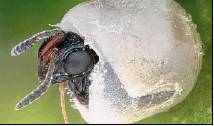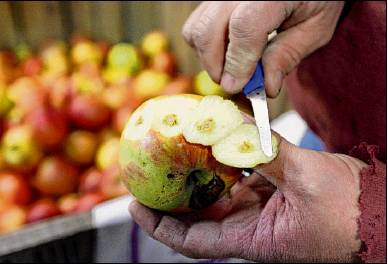SCIENCE
The battle of the bugs has been launched
By robert Downen
Albany
The first casualty of the Great Pest War this season was a baby, killed by cuckolding wasps.
That baby was a beetle — beetle larvae to be exact.
Albany County last week became a battleground between parasitic wasps and the beetles that have been wreaking havoc in gardens across the state.
For years, gardeners in as many as 30 New York counties have struggled to stave off the pests that can devastate plants. In some instances, gardeners simply quit growing them entirely.
Researchers from Cornell University believe the wasps, which were first evaluated at the University of Rhode Island in 1999, will keep the beetle population in check by laying eggs in their larvae.
Similar tactics are being planned for fights on farms across the state and nation, which since the 1980s have been rapidly infected by foreign insects that arrived from Asia with internationally-traded goods.
Samurai wasps, for example, are currently being prepped for battle with the brown marmorated stink bugs that have destroyed crops across the state and country.
Peter Jentsch, director of the Hudson Valley Research Laboratory, says the stink bugs have decimated some apple farms, and between lost product and increased pesticide use have cost as much as hundreds of thousands of dollars.
Like the wasps being deployed in Albany and Putnam counties, the Samurai wasp kills its prey by laying its own eggs in other’s larva. And while they’re only about the size of a pinhead, their potential to fight off the invasive stink bugs could curb some pesticide use at farms, and in homes and gardens.
But this will be a slightly different form of combat. First, Jentsch needed to bait wasps into a colony at his lab, where they then lay eggs inside the stink bug eggs.
Once that colony is finished — and once he gets the OK from the state — he’ll release about 25,000 of the wasp-infected stink bugs in various parts of New York.
Though native to Asia, Jentsch said the wasp already exists in the state. Now, it’s just a matter of spreading out the population.
“It’s a biological control that’s often found in nature,” he said. “The reason so many things are kept in check is because one insect or organism feeds on another.”
You can’t eliminate it, but you can keep it in check — you can keep it in balance.”
The Finger Lakes region, meanwhile, could soon become the breeding ground for a first-of-its-kind species: Genetically modified moths.
British researchers years ago discovered how to modify and control the so-called diamondback moths that destroy crops.
The “self-limiting gene,” Oxford University scientists told Reuters in 2015, has already been used to kill up to 90 percent of dengue fever-carrying mosquitoes in Brazil, Panama and the Cayman Islands.
“This research is opening new doors for the future of farming with pest control methods that are non-toxic and pesticide-free,” Neil Morrison, a research scientist who led the study, said at the time.
They estimate the pests cause up $5 billion in lost vegetable crops each year — including in New York.
“Diamondback is a serious problem for farmers in New York State and around the world — anywhere cruciferous vegetables and field crops are grown,” Tony Shelton, an entomology professor at Cornell University, told Reuters. “These moths invade and attack the crops, and they are developing resistance to insecticides, so we urgently need new tools to better control them.”
But one group is already calling for the moth’s first open-air trial run, in Geneva, to be halted.
In a statement last week, the Northeast Organic Farming Association of New York denounced the plan, calling it a “major activity with potentially significant and heretofore health and environmental effects.”
Because this would be the first worldwide release of a new insect, NOFANY said, “this should trigger a full environmental review” by state regulators.
• rdownen@Timesunion. Com • 518-454-5018 • @ Robertdownentu

